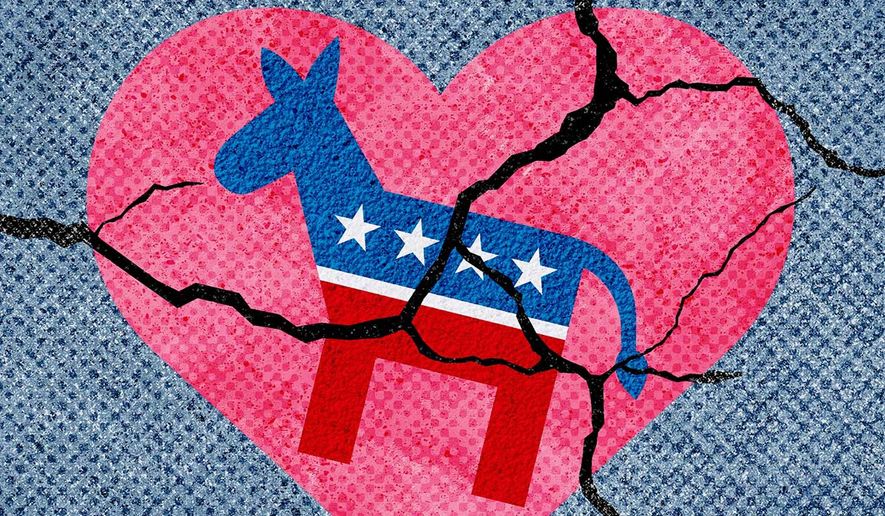OPINION:
Many in the media and professional pundit class were quick to jump to the bottom-line results of the 2022 midterms — which party won control of the House or the Senate, did Democrats or Republicans perform better, and what the 2022 election means for 2024. It’s natural to cover this election by using this traditional analysis, but it misses the broader point.
America is in the midst of a multi-election cycle political realignment, and it’s not over. What we saw in the 2022 midterms can best be compared to personal relationships. Sometimes breaking up is hard to do.
Nearly everyone has had some sort of personal relationship that ended. Sometimes the partners backtrack and get back together, split again, and repeat this pattern over and over until it eventually ends or makes it for good. Oftentimes the same problems that led to the initial breakup return and lead to a roller coaster of subsequent breakups.
This phenomenon is not unusual in people’s personal lives. It is also happening in politics.
People are breaking up with the Democrat party because it does not represent their values or offer meaningful solutions to their problems. Democrats can try to delay it and woo their supporters back by promising to fix their relationship issues and do better in the future, but it won’t work.
President Biden and Sen.-elect John Fetterman are not going to suddenly support fracking. The president is not going to suddenly support American energy and lower gas prices. Mr. Biden won’t miraculously open his eyes to the crisis at the border and secure it. Rep. Alexandria Ocasio-Cortez and Sen. Bernie Sanders will not change their minds on inflation and cut the out-of-control government spending that originally caused this economic crisis.
If you need proof of this political realignment, look no further than the 2022 elections and the elections that preceded it. Recent high-profile national elections, going back to 2016 and including the 2022 midterms, have largely been waged in traditionally blue states.
Former President Donald Trump won the 2016 election by breaking the Democrats’ so-called blue wall of Wisconsin, Michigan and Pennsylvania.
In 2020, the campaign focused again on the blue wall, with the addition of Georgia and Arizona. Still mostly fought on blue territory.
In 2022, the same key states, mostly blue, became the focus, but this time the map expanded to California, New York, Oregon, New Mexico and Nevada — most certainly not red states.
Even if the results from Election Day 2022 did not produce as many wins as many expected, Republicans closed the gap in many traditionally blue states and districts.
The chair of the Democratic Congressional Campaign Committee lost his seat in New York. The governor’s race in New York was decided by 5 percentage points. Statewide races in Nevada, which has been solid blue for decades, are still close, as were statewide races in blue states such as Oregon and Washington. Mr. Biden even had to travel to New Mexico to save the state’s governor. New Mexico has voted for a Republican president only once in the last 30 years, and that was George W. Bush in the aftermath of 9/11.
Political realignment, much like ending relationships, often takes multiple attempts before it finally takes hold. Mr. Trump jump-started that realignment in 2016, and Republicans are continuing to build upon it. The Associated Press’ VoteCast, which compares 2020 and 2022 voter demographics, shows Republicans gained 22% more support from Hispanic and Latino voters, 14% more from Black voters, and 5% more from White voters with college degrees. Republicans also expanded our advantage with white voters without a college degree by 6%. This shows Republicans winning more support from critical Democrat voting blocks, as well as expanding its support from traditional conservative voting groups.
So, if you view 2022 strictly in terms of wins and losses of elections, yes, it wasn’t the best result. But getting people to break up with the party they’ve supported blindly for decades is hard and requires patience. Close elections today could point to victories in the years ahead as more and more disillusioned Democrats realize they broke up with Democrats for a reason. The issues remain the same and that inevitable breakup will finally stick in the not-too-distant future.
• Marc Lotter is former special assistant to President Donald J. Trump, press secretary to Vice President Mike Pence, and director of strategic communications to the Trump-Pence 2020 campaign.




Please read our comment policy before commenting.